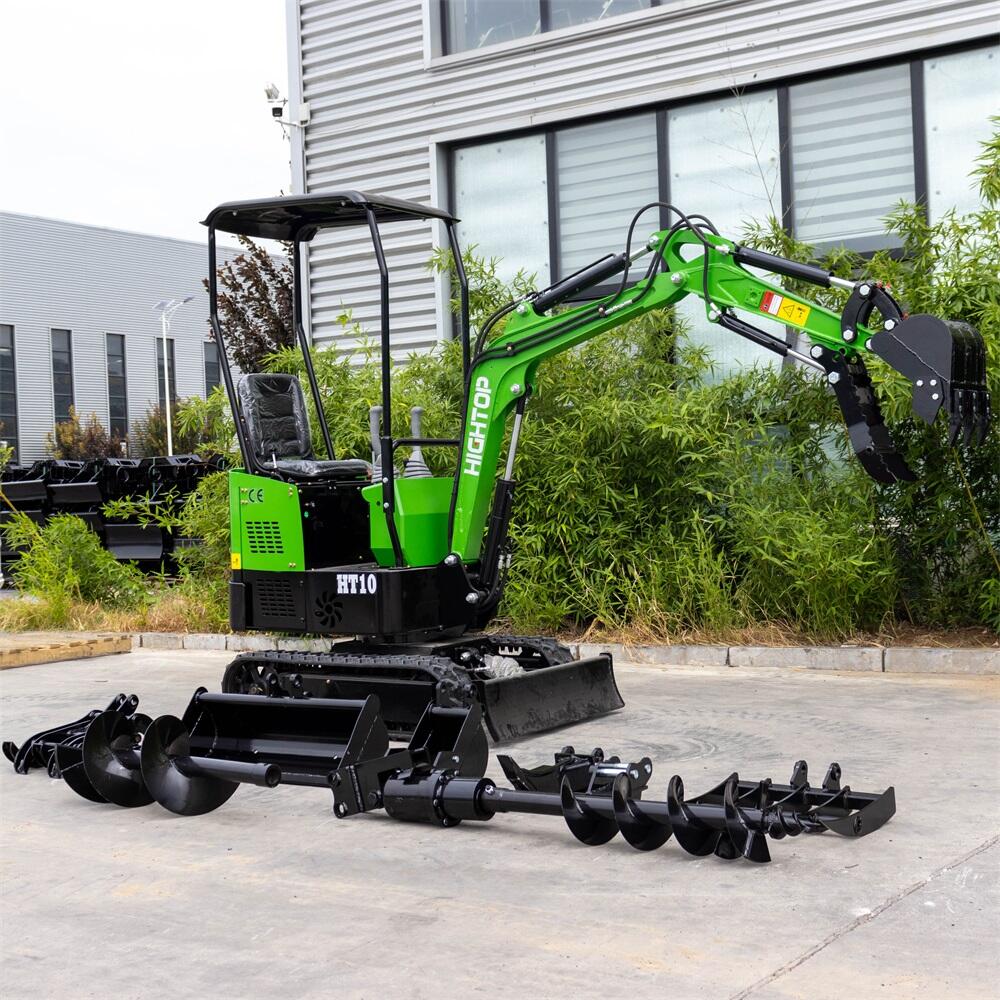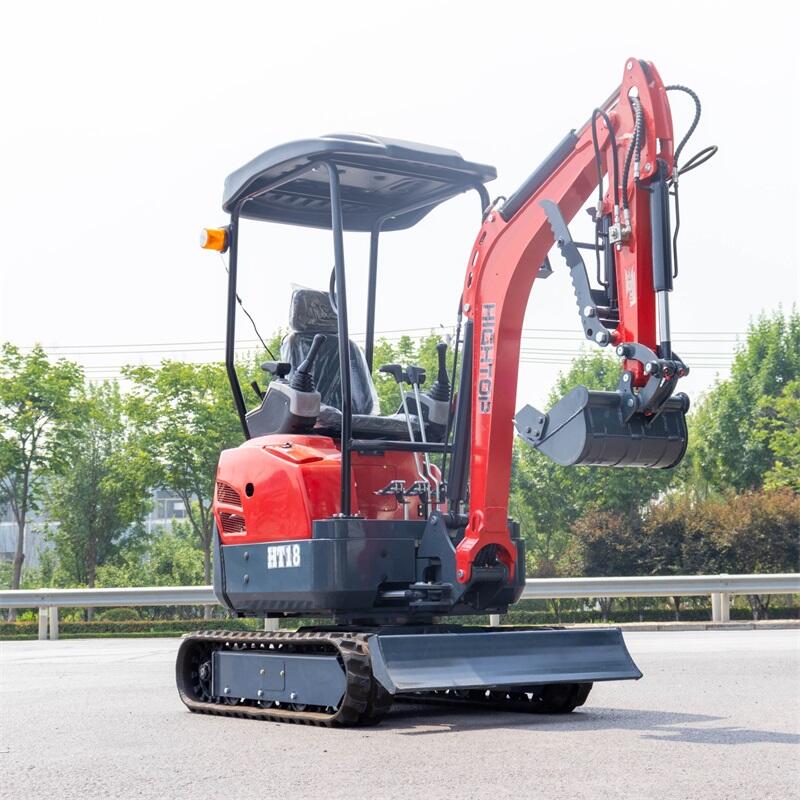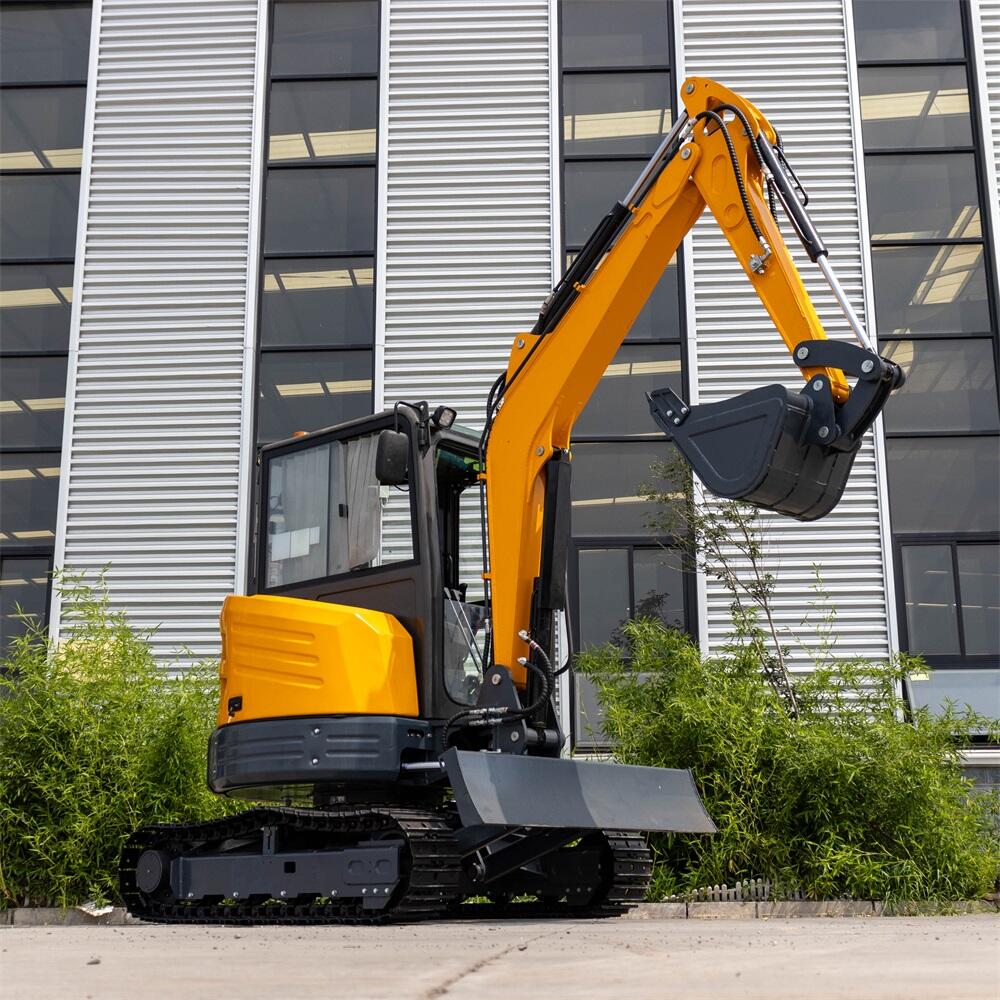Revolutionize Your Worksite with Advanced Mini Hydraulic Excavators
Key Features of Advanced Mini Hydraulic Excavators for Construction
Compact Design for Tight Workspaces
Mini hydraulic excavators were built with tight spaces in mind, making them perfect for city construction jobs where room is at a premium. The small size lets workers move around buildings and other structures much easier while still getting the job done right. One thing that stands out about these little machines is their zero tail swing design. This means they can operate close to walls or fences without knocking into anything important. Because of their compact build, these excavators get into places big equipment simply cannot reach. They've become a must have tool for contractors working on projects in crowded downtown areas or narrow alleyways where traditional excavators just won't fit.
High-Efficiency Hydraulic Systems
Mini hydraulic excavators come with advanced hydraulic systems that give them serious lifting power while maintaining pinpoint control. The improved systems cut down on cycle times so workers can get their jobs done faster, which is pretty important when time is money on construction sites. What really stands out though is how these machines use variable flow pumps to save fuel without sacrificing performance. Contractors love this because it means they spend less at the pump while still getting the job right. For anyone working on tight deadlines where precision matters as much as speed, these compact excavators have become indispensable tools in recent years.
Fuel-Saving Engine Technology
Today's mini excavators come equipped with engines that save fuel and help keep running costs down without sacrificing the power needed for the job. Most of these machines meet tier standards which means they follow government rules about emissions while still saving money at the pump. Research shows that when builders switch to these efficient models, their operating expenses drop around 20% give or take depending on usage. The savings add up fast for small contractors who run multiple machines across different sites. What makes this even better is how it works out for both wallet and planet. Construction firms get real value from these machines because they spend less on fuel and maintenance over time.
Multi-Functional Attachment Compatibility
Mini hydraulic excavators really shine when it comes to working with different attachments. Think buckets for digging, augers for boring holes, and even demolition hammers for breaking through tough materials. The ability to switch between these tools means operators aren't limited to just one job site task. They can dig trenches, level ground, drill foundation holes, or tear down old structures without needing separate machines for each function. Contractors love this because they get so much bang for their buck. A single mini excavator can tackle dozens of applications depending on what attachment gets bolted on. That kind of adaptability makes these little machines absolutely essential across all sorts of construction sites where space is tight but work needs to be done fast and efficiently.
Top Advanced Mini Hydraulic Excavators for Construction
HT10B 1ton Mini Excavator: Precision in Compact Spaces
The HT10B mini excavator was built to handle tight spots where bigger machines simply can't go, which makes it ideal for city building work in crowded areas. At only one ton, this little machine packs quite a punch thanks to its smart hydraulic system that gives operators both control and muscle when they need it most. The small footprint means crews can easily move it from one location to another without needing special transport equipment, something that saves time and money on site transitions. What really stands out though is the tough engine and quality parts that come straight from cutting edge manufacturing hubs around the world. These components hold up under pressure, so workers don't have to worry about breakdowns during those long days on tough terrain.
HT18-3 1.8ton Mini Excavator: Power Meets Maneuverability
The HT18-3 mini excavator packs quite a punch when it comes to both power and agility, especially considering its 1.8 ton capacity. Built using some pretty smart engineering tricks, this machine has been tweaked so the hydraulics work better together, allowing operators to tackle tough jobs even when space gets tight on site. What really stands out though is the zero tail swing feature. This means contractors can work right next to buildings or other obstacles without worrying about damaging them accidentally. Contractors love these machines because they handle everything from small residential digs to bigger commercial sites where traditional equipment just won't fit.
HT35 3.5ton Mini Excavator: Heavy-Duty Performance
The HT35 mini excavator packs serious punch for its size at just 3.5 tons, making it ideal for tough jobs around construction sites that need real muscle without overkill. With plenty of hydraulic power under the hood, this little beast handles trench digging and ground leveling with ease, which is exactly what contractors need when working on major infrastructure projects. Constructed from tough steel and reinforced parts throughout, the HT35 lasts longer between repairs and saves money on maintenance down the road. What really sets it apart though is how easily operators can swap out attachments depending on what task comes next. Whether it's breaking up concrete or compacting soil, the sturdy chassis holds up through all sorts of rough conditions while keeping productivity levels high.
Applications Revolutionizing Construction Sites
Urban Infrastructure Development
Small excavators are now pretty much a must-have for work on city infrastructure because they can move around in those really cramped construction zones so well. They handle all sorts of jobs from laying down building foundations to fixing roads when space is limited. What makes these machines stand out isn't just how fast they get things done but also how little trouble they cause for people living nearby, especially in busy parts of town where every minute counts. Cities keep growing faster than ever before, which means there's increasing pressure to build better infrastructure without wasting resources. That's why mini excavators play such an important part in setting up utilities and upgrading roads across urban landscapes today. Their presence helps make sure our cities continue developing while still keeping costs under control.
Landscaping and Precision Excavation
Landscaping is changing fast thanks to mini excavators that can dig and grade with amazing accuracy. When working on detailed projects like garden installations or park development, these small machines really shine compared to bigger equipment. What makes them special? Well, they're tiny enough to get into tight spots where larger machinery would struggle, yet powerful enough to handle tough jobs like removing tree stumps or shifting dirt around. The latest improvements in controls have made these little diggers even better at creating complex landscape features. Landscape architects love what they can do because now it's possible to match their designs almost exactly when building out those elaborate outdoor spaces that clients want so badly these days.
Utility Installation in Confined Areas
For utility installations, those little hydraulic excavators really shine when space is tight. Think between buildings packed closely together or next to roads that barely fit two lanes. Because they're so small, these machines can get into spots where big equipment would just get stuck, which cuts down on all that extra prep work needed for bigger machines. When working in these cramped conditions, mini excavators handle jobs like digging trenches, running electrical lines underground, and putting in water mains without causing too much trouble. What matters most is getting the job done right while keeping damage to nearby structures and landscapes to a minimum. That's why contractors keep coming back to these compact machines time after time for everything from street repairs to residential hookups. The fact that they can squeeze into tough spots while still doing quality work makes them practically essential for any serious utility project.
Choosing the Right Mini Excavator for Your Project
Evaluating Job Site Requirements
Picking out the correct mini excavator starts by really looking at what the job site actually needs. Think about things like how tight the space is and what kind of work has to get done these details determine what kind of machine will work best. Urban jobs especially have limited room to move around, so machines need to fit into small spaces without getting stuck. Knowing what kind of dirt we're dealing with matters too different soils require different amounts of power from the excavator. Don't forget about attachments either some jobs need special tools attached to the bucket. A good idea is to make a list of all these factors before making any decisions. This helps catch those little details that might otherwise slip through the cracks when trying to decide on equipment for a particular project.
Comparing Fuel Efficiency and Maintenance Costs
Picking out a mini excavator? Don't forget to look at how much fuel it burns and what kind of maintenance headaches it might cause down the road because these things really eat into wallet over time. Some models are way better at saving fuel than others, and this matters big time on big construction jobs where those daily running costs just keep stacking up day after day. Maintenance isn't something to brush aside either. A reliable machine means fewer breakdowns and less money spent fixing problems when they pop up. Check out what other contractors say about different models online or ask around at local equipment dealerships. Most manufacturers publish specs showing typical fuel burn rates and service intervals for their machines. These numbers help companies find that sweet spot between getting good work done without breaking the bank on operational costs.
Understanding Attachment Versatility Needs
When picking out a mini excavator, knowing what kind of attachments work best for different jobs really matters because getting the right ones makes all the difference in how useful the machine becomes on site. For instance, digging trenches versus breaking up concrete needs completely different tools attached to the same base unit. Before buying anything new, take stock of what attachments already exist in the fleet and check whether they'll fit onto this particular model or if some cash has to be spent on replacements. Look into machines with those handy quick change systems too since switching from one tool to another takes seconds instead of minutes. A good mini excavator should handle everything from standard buckets to specialized augers without missing a beat, which means workers spend less time waiting around and more time actually getting things done across various construction sites and landscaping projects alike.




